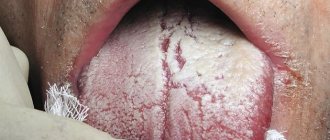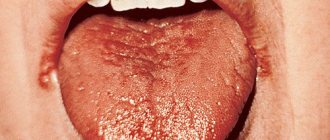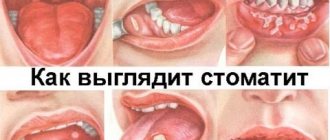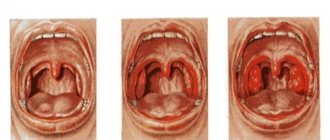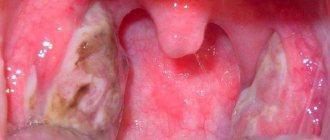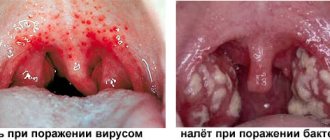Possible reasons
Burning and pain can indicate a variety of diseases. Most often it is caused by respiratory diseases. A feeling as if there is a burn in the throat can occur with neurosis, stomatitis, tumors and other pathologies. Therefore, if the symptoms do not go away for more than 10 days, you should definitely consult a doctor.
Stomatitis
The cause of stomatitis is the entry of pathogenic microorganisms into the oral cavity. However, not everyone gets the disease. A number of factors should contribute to this:
- Poor nutrition. Insufficient amounts of vitamins and minerals enter the body, which reduces immunity.
- Damage to the mucous membrane. This can happen due to a burn, using a toothbrush that is too hard, and other reasons. Even minor damage increases the risk of pathology.
- Failure to comply with hygiene rules. You should always wash your hands and food. Proper oral hygiene is also very important.
Stomatitis can appear at any age. However, its symptoms are always the same. Rarely, the disease is accompanied by severe intoxication and fever.
Usually the mucous membrane of the mouth turns red and becomes painful. Over time, round ulcers form. This makes it difficult for a person to swallow and makes it difficult to eat. When you touch the wound, very severe pain and burning occurs.
In some cases, this interferes with normal conversation. Stomatitis is also accompanied by a stink from the mouth.
Candidiasis
Candidiasis, or thrush, appears as a result of the action of Candida fungi. These microorganisms are found in the oral cavity of every person. But under the influence of certain factors, they can begin to actively multiply, leading to the appearance of pathology.
This disease is most often observed in young children. They put toys and other objects that contain harmful bacteria into their mouths. Candidiasis can also be caused by poor personal hygiene by a woman who is breastfeeding.
A white coating appears on the mucous membrane. At first there is not much of it, but over time its amount becomes larger, it looks like large plaques. It is easily removed, but underneath there is redness or even a wound.
Candidiasis is accompanied by other symptoms - pain, burning, bad breath. All this makes it difficult to eat. In the absence or improper treatment, the disease can become chronic. As a result, treatment will become more difficult, as pathogens will become resistant to a number of drugs.
Diseases of the throat and larynx
Very often the throat “burns” with the following diseases of the hypopharynx:
- Angina. The most common are lacunar and follicular tonsillitis. They are accompanied by pain and burning in the throat, weakness and a general feeling of poor health. The throat becomes swollen, red, and a purulent coating appears on its surface.
- Tracheitis. Accompanied by a severe cough, the symptoms of which appear mainly at night. Severe attacks irritate the mucous membrane of the throat, causing pain.
- Laryngitis. This is an inflammation of the larynx, accompanied by soreness and burning in the throat area. The temperature may rise slightly. Also, laryngitis is often accompanied by a dry cough and loss of voice.
- Pharyngitis. It is often a complication of sinusitis. Accompanied by unpleasant sensations in the throat, redness, and the appearance of tubercles on the mucous membrane. Patients often complain of a feeling of a foreign body in the throat. A large amount of viscous mucus is produced, which is difficult to separate.
All of the above diseases easily become chronic if treatment is not started in time.
Digestive system problems
In diseases of the gastrointestinal tract, pain and burning in the throat have accompanying symptoms - bad breath, bitter taste, flatulence, disruption of the bowel movement, discomfort in the stomach and others.
A burning sensation in the throat can occur with the following pathologies:
- Gastritis. It is an acute inflammatory process of the stomach that occurs after taking certain medications, due to poor diet and for other reasons. With this disease, frequent belching, heartburn, and nausea are observed. Because of this, the mucous membrane of the pharynx dries out and soreness appears.
- Reflux esophagitis. Stomach acid backs up into the esophagus, irritating it. Often it reaches the throat. Constant irritation of the mucous membrane leads to its dryness. The result is a sore throat, lump, heartburn, and sour belching.
- Achylia of the stomach. Gland atrophy occurs. This condition is caused by insufficient hydrochloric acid in the gastric juice.
Very often, a person does not associate discomfort in the throat with the stomach and continues to take various medications to relieve symptoms. Meanwhile, the disease progresses. Therefore, if unpleasant symptoms appear, consultation with a gastroenterologist is also required.
Allergy
A sore throat may be due to allergies. This usually occurs after inhalation of an allergen. The irritant can be dust, pet hair, pollen and others. Often, unpleasant symptoms appear seasonally and coincide with the period of flowering of plants or molting of animals.
Tumors
Neoplasms in the throat are very difficult to diagnose in the early stages, since they are accompanied by the same symptoms as other diseases of this area. In the later stages, very severe pain appears, the swallowing process is disrupted, the patient’s voice disappears, and swelling may occur in the neck. But throat tumors are quite rare. The risk group includes long-term smokers, as well as older people.
Other reasons
Also, pain and burning in the throat can occur due to endocrine disorders in the body. When the thyroid gland enlarges, it begins to compress neighboring tissues, causing a burning sensation and dryness in the throat, a sensation of a foreign body in the larynx, and swelling of the neck.
And burning, numbness and impaired swallowing may indicate pharyngeal neurosis. This condition is often observed in people with hysteria or neurasthenia.
Similar signs may appear with vegetative-vascular dystonia. The elasticity of blood vessels is impaired, and the tone of the pharyngeal muscles decreases. This leads to unpleasant sensations in the patient.
Thyroid diseases
Why might my throat “burn”? One of the common causes of discomfort in the respiratory tract is endocrine disorders. Hypertrophy of the thyroid gland leads to compression of the tissues of the throat, as a result of which the patient feels a strong burning sensation and dryness in the mucous membranes of the oropharynx.
The most common causes of endocrine diseases are:
- iodine deficiency;
- hormonal disorders;
- oncological diseases;
- autoimmune disorders;
- relapses of colds.
Enlargement (hypertrophy) of the thyroid gland is most often signaled by difficulty swallowing, soreness and burning in the throat, swelling of the neck and lack of air. If a patient has a burning sensation in the throat due to the development of endocrine disorders, the problem can be eliminated by taking hormonal medications.
Diagnostic methods
To diagnose the disease, you need to contact an ENT specialist. If the doctor does not identify abnormalities in his part, he can refer the patient to other specialists - a gastroenterologist, endocrinologist or neurologist.
Laboratory tests can include a general and biochemical blood test, a throat smear to determine microflora. But more informative are instrumental diagnostic methods - pharyngoscopy, FGDS, x-ray of the cervical spine and other procedures.
How can you get rid of a sore throat?
Causes
A very common cause of burning and sore throat is vocal stress.
Most cases when a sore throat occurs is accompanied by an inflammatory process in the pharynx. This disease is one of the first symptoms of acute and chronic pharyngitis, which is accompanied by painful sensations in the throat, rawness, and high fever.
In turn, pharyngeal neurosis is a pathological condition of the pharynx, which is caused by a central nervous system disorder, brain tumor or syphilis. This disease is often accompanied by the following symptoms:
- Increased sensitivity of the pharynx;
- Presence of a sensation of “lump in the throat”;
- Pain extending to the larynx, ear;
- Tingling;
- Burning;
- Pressure.
A very common cause of burning and sore throat is vocal stress. In particular, this applies to teachers, singers, announcers, whose responsibilities include long conversations. It is impossible to get around the fact that people involved in singing experience soreness less often than teachers, since they have a well-trained voice and also breathe correctly. This cannot be said about teachers, because for them such an illness is a professional problem.
Reflux gastroesophagitis (known as a violation of the closure functions in the lower esophageal sphincter) is another popular root cause of the development of soreness. In the process of such a violation, all the acidic contents of the stomach are thrown into the esophagus, and irritation of the mucous membrane occurs. This disease entails burning, pain, soreness in the throat and along the esophagus.
If tickling occurs after eating or while lying down, you should immediately seek help from a doctor. These symptoms indicate the presence of gastritis, stomach disease, hiatal hernia and cholecystitis. Nodules of the thyroid gland, putting pressure on the trachea, provoke a sore throat, voice changes, weakness, and loss of appetite.
Treatment
It is important to start treatment on time, since the disease poses a danger to the body.
Inflammation in the pharynx is a great danger, as it can spread to the lower respiratory tract (bronchi, trachea, lungs or bronchi). Therefore, it is necessary to begin treatment of the disease in a timely manner. In this case, there must be supervision by an ENT doctor who will carry out a course of treatment in the shortest possible time and will not allow complications to arise.
During treatment, you should follow a diet: control all foods consumed, limit the consumption of chilled drinks and foods, exclude spicy and sour foods, and refrain from hot foods. All these factors have a bad effect on the mucous membrane of the throat, contributing to greater tissue irritation.
Treatment may be:
- Etiotropic;
- Pathogenetic;
- Symptomatic.
Hyposensitizing and restorative treatment of this disease also plays an important role.
Therapy
To eliminate unpleasant sensations, medications are prescribed in the form of tablets, injections, sprays and drops. You can also use folk remedies, but only after consulting a doctor.
Drug treatment
Several groups of drugs can be used to treat a sore throat:
- Homeopathic medicines. They have a natural composition, so they cause almost no side effects, but at the same time they are very effective. Such drugs help eliminate pain, relieve swelling and heal the mucous membrane. For example, you can use Doctor Mom, Isla-Mint and other medications.
- Antibiotics. Their use is justified for candidiasis, stomatitis and bacterial throat diseases. But you can take such drugs only after consulting a doctor, as they can disrupt the microflora of the stomach.
- Antiseptics. There are products that contain several components at once, they are called combined (Angilex, Strepsils). And there are drugs that contain only one antiseptic and have a good bactericidal effect (Septolete, Faringosept and others).
For stomach diseases, medications are prescribed that speed up digestion and relieve symptoms of flatulence. Motilium, Omeprazole, Omez and others are effective.
For neurological disorders, the doctor may prescribe herbal-based sedatives. They are weak and do not cause addiction, but their use is sufficient to eliminate disturbing symptoms.
Folk remedies and recipes
Of the folk remedies, rinsing is the most popular. To do this, you can use a weak saline solution (1 teaspoon of sea salt per glass of water), a soda solution with iodine (0.5 teaspoon of soda and 2 drops of iodine per glass of water). Decoctions of medicinal herbs that have antiseptic properties (chamomile, calendula) are also useful. For rinsing, you can use red beet juice, but it dries out the mucous membrane, so it needs to be added in small quantities - 0.5 tsp. per glass of warm water.
You can also do inhalations using the same solutions and decoctions. You can add 1-2 drops of essential oils of mint, cedar, fir. Inhalations are useful when the inflammatory process involves not only the throat, but also the respiratory organs.
Features of treatment
The main task of an otolaryngologist is to prevent the disease from becoming chronic and developing systemic complications . So, in case of inflammation in the respiratory tract, antibacterial or antiviral drugs are designed to influence the pathogenetic factor (depending on the etiology of the pathogen).
Early prescription of antibiotics, taking into account the resistance of infectious agents, can provide rational control over signs of inflammation, improve clinical manifestations, and shorten recovery time.
The process of reproduction of microbial communities is stopped by penicillin drugs (Ampicillin, Amoxiclav), macrolides (Sumamed, Erythromycin, Roxithromycin), cephalosporins (Cefuroxime, Cefepime).
Treatment of a burning sensation in the throat due to infectious and inflammatory diseases of the pharynx will be complex and includes anti-inflammatory drugs, antiseptics with an analgesic effect, and immunomodulators.
For reference! Symptomatic medications for eliminating heat in the throat are characterized by a variety of dosage forms, and are represented by tablets, sprays, rinses, and lozenges.
It would be justified to carry out local antimicrobial therapy with medications of different pharmaceutical activity, including:
- Antiseptics : “Chlorophyllipt”, “Hexoral spray”, “Miramistin”, “Septolete”, “Doctor Mom”, “Faryngosept”, “Ingalipt”. They are designed to reduce inflammation and pain in the throat, accelerate the process of tissue regeneration, and disinfect the pharyngeal mucosa.
- Anesthetics . They block the conduction of pain impulses and have a temporary analgesic effect. The drugs of choice will be “Grammidin”, “Decatylene”, “Anti-angin”, “Hexoral Tabs”.
- Essential oils : casputa, juniper, eucalyptus, clove, levomenthol. Used for inhalation, gargling, treatment of tonsils and adjacent tissues. Volatile substances demonstrate anti-inflammatory, antiseptic, analgesic abilities, relieve irritation, and moisturize dry mucous membranes.
Since the conditions for the development of the inflammatory process with clinical manifestations of a burning sensation in the throat is an immunodeficiency state, the prescription of bacterial lysates, vitamin complexes, and immunocorrectors would be justified .
They enhance adaptive antimicrobial immunity, reduce the risk of re-infection, and facilitate the clinical course of the pathology. In combination with pathogenetic and symptomatic therapy, a gentle, balanced diet rich in vitamins is recommended. Food should be easily digestible, soft or liquid in consistency, so as not to further injure the irritated mucous membrane.
Soothes discomfort in the throat and rehydrates the mucous membrane by drinking plenty of warm alkaline drinks . Preference is given to mineral water, milk with honey, herbal teas, jelly, fruit and vegetable fruit drinks. Depending on age, a child needs to drink up to 2 liters of liquid per day, an adult even more.
For reference! I help relieve a burning sensation in the throat using folk remedies: rinsing with soda, salt, herbal infusions of chamomile, yarrow, St. John's wort, eucalyptus.
Treatment of bitterness in the mouth
It is impossible to cure bitterness in the mouth without eliminating the underlying disease. However, there are general recipes to help get rid of this unpleasant symptom. It is necessary to rationalize nutrition, exclude fatty, sweet and spicy foods, alcohol, and limit smoking.
The following drugs, prepared according to traditional medicine recipes, help temporarily remove the bitter taste and help restore appetite.
- Corn silk tea. Place a tablespoon of plant material in a glass of boiling water and leave for about an hour. During the day you need to drink this amount of infusion at regular intervals. You should not drink more than 50 ml at a time;
- Flaxseed is infused in the same way, only 2 teaspoons are brewed for the same amount of boiling water. During infusion, flaxseed tea needs to be stirred constantly. The product is considered ready when it reaches the consistency of jelly. Drink before meals. This infusion helps get rid of erosive gastritis, stomach and duodenal ulcers;
- Herbal teas from chamomile, calendula, and marigold relieve bitterness;
- A mixture of vegetable juices squeezed from celery, carrots, and parsley helps restore a pleasant taste in the mouth. Cocktail ingredients: 30 ml parsley juice, 100 ml carrot juice, 75 ml celery juice. You need to drink this cocktail during the day, 2 times.
To relieve intoxication of the body, it is necessary to expand the drinking regime, introduce rosehip infusion, berry fruit drinks, dried fruit compotes, mint, elderberry, and chamomile infusions into the daily menu.
It is imperative to sanitize the oral cavity, remove the symptoms of chronic pharyngitis - rinse the purulent plugs in the larynx; pay attention to the condition of the nasal sinuses. If the bitterness in the mouth is caused by a stressful condition, you need to disconnect from what is happening around you, get a good night's sleep, relax, and increase the time you spend walking in the fresh air.
The bitterness will not go away immediately, but gradually, with the treatment of the underlying diseases, the condition will return to normal. Auxiliary recipes will help restore your appetite and feel the taste of life again.
Source: mjusli.ru
